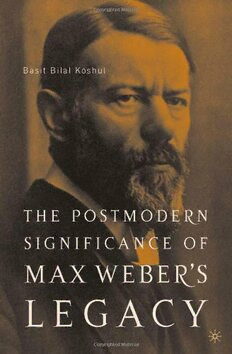
The Postmodern Significance of Max Weber's Legacy PDF
189 Pages·2005·0.727 MB·English
Most books are stored in the elastic cloud where traffic is expensive. For this reason, we have a limit on daily download.
Preview The Postmodern Significance of Max Weber's Legacy
Description:
One of Max Weber's contemporaries described him as "a child of the Enlightenment born too late" whose work is a "vitriolic attack on religion." Subsequent Weber scholarship has largely affirmed this valuation of Weber and characterized his scholarship as a manifestation of the very disenchantment that Weber describes. In The Postmodern Significance of Max Weber's Legacy, Basit Koshul challenges this idea by showing Weber to be a postmodern thinker far ahead of his time. Koshul's reading demonstrates that Weber implicitly bridged the religion vs. science divide and offers us new directions in Weber scholarship.
See more
The list of books you might like
Most books are stored in the elastic cloud where traffic is expensive. For this reason, we have a limit on daily download.
